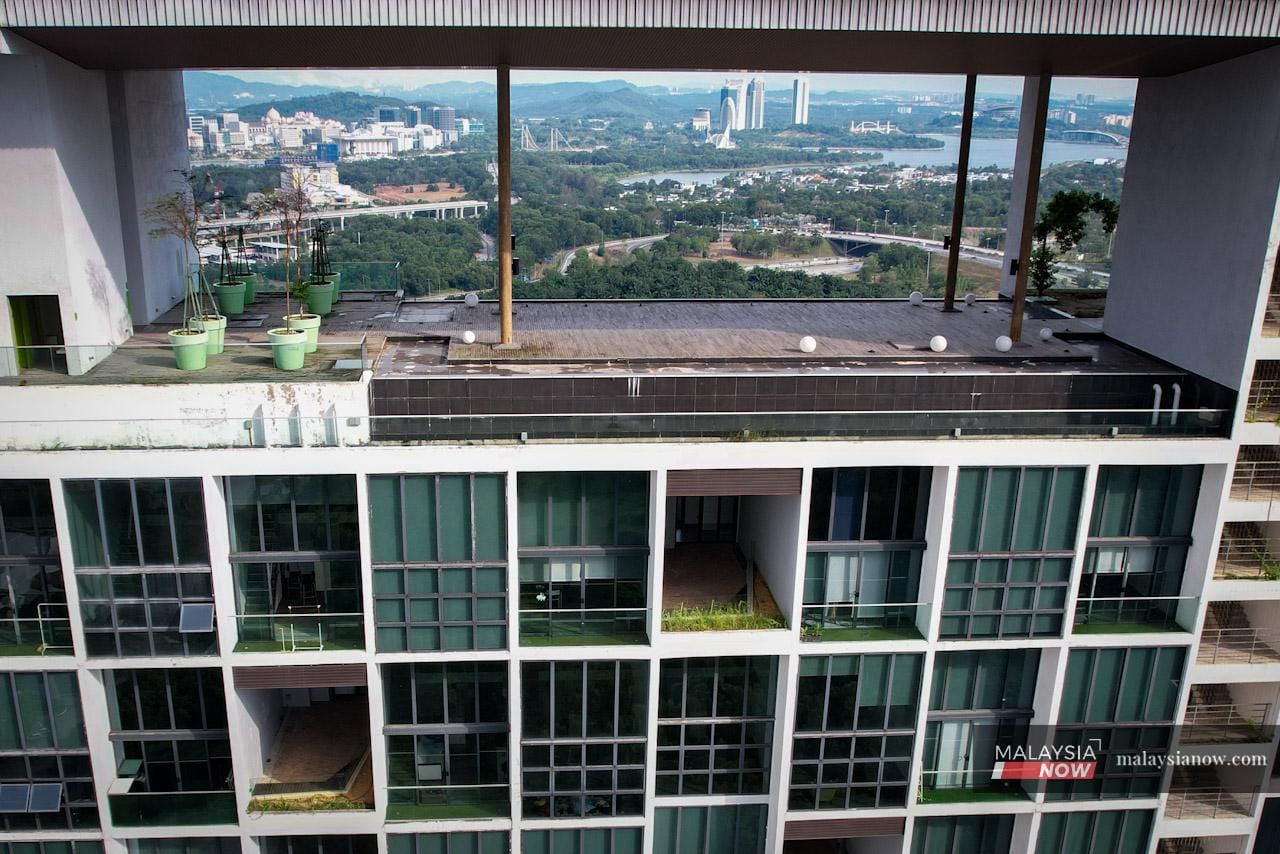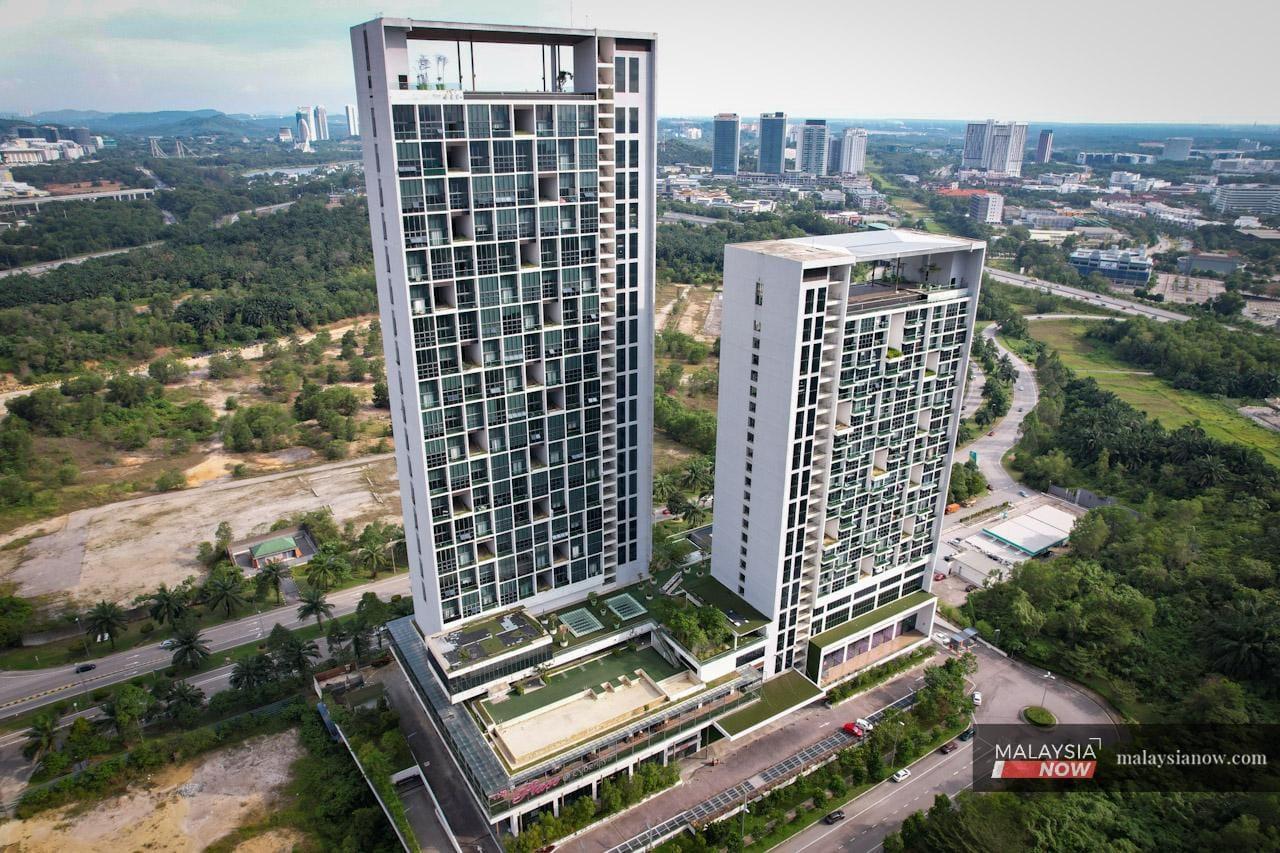Abandoned luxury units show pandemic’s impact in Malaysia’s Silicon Valley
The devastation brought by the Covid-19 pandemic is plain to see in Cyberjaya's real estate market.
Beneath the glitter of Malaysia’s IT city Cyberjaya, a slow decline appears to be taking place, perhaps most clearly seen in its real estate segment which has been struggling to stay afloat in the aftermath of the Covid-19 pandemic.
While it once aspired to become the country’s Silicon Valley, throughout the city, a number of luxury condominium complexes are now falling into disrepair – abandoned, neglected and bleeding tenants.
The Place, located less than 220m away from Limkokwing University of Creative Technology (LUCT), is one of them.
Once the top choice for students from both within and outside of the country, its exclusivity meant that monthly rental for its residential units could run into the thousands.
Its commercial units meanwhile were known for services rarely found at other condominium developments including a gym, clothing boutiques, bars and cafes.
Today, fewer than 10 units are still in operation including two convenience stores, a stationery shop and a restaurant newly opened this year.
Elsewhere, The Domain@NeoCyber, a serviced apartment complex completed in 2009, now stands mostly empty.
Such condominiums were initially targeted at knowledge workers – professionals such as engineers, doctors, bankers, accountants, lawyers and scientists – in line with Cyberjaya’s role as a key part of the Multimedia Super Corridor, an ambitious project launched by former prime minister Dr Mahathir Mohamad.
But even before the onset of the Covid-19 pandemic, Cyberjaya was far from the bustling, smart city metropolis envisioned at its establishment in 1997.
Many buildings with their futuristic designs lacked the buzz needed for a thriving real estate market, but a host of university campuses provided a lifeline for home owners who could rent out their units to international students for a reasonable rate.
That lifeline was taken away when the pandemic struck.
Now, real estate analysts say the city has all but failed to achieve its goals.

Adzman Shah Mohd Ariffin said Cyberjaya was meant to be an organic city where knowledge workers would work and live, and where businesses like overseas bank branches, database services and customer service centres would thrive.
“Cyberjaya’s growth should have been organic,” he told MalaysiaNow.
“But it strayed from its goal and instead became a student town.”
Adzman said the presence of so many students had caused working professionals to look elsewhere for accommodation.
The city itself meanwhile morphed into an investment centre for residences to be rented out to college and university students.
While students rented in large numbers, their tenancies were short-term and did not contribute towards increasing the value of property.
Nevertheless, buyers began targeting students, and when business in the education sector began to decline due to Covid-19, the impact on the residential units was massive.
“Residential units were dumped,” Adzman said.
“In NeoCyber, most of the units have been sold but there are no tenants. When there are no tenants and the owners themselves do not live there, there is no money for maintenance.
“This is why many of these places become dirty, damaged and abandoned.”
Just about three years ago, The Place and The Domain were seen as dream homes for those who could afford the rent.
But a property agent who spoke to MalaysiaNow said rental at The Place had dipped as low as RM1,200 a month, with many owners lowering this to RM900 or even RM800 since the onset of the pandemic.
Foreign students, who made up half of the tenants there, had to cancel their agreements and return to their home countries.
A large number of students also stopped studying at LUCT, which a source attributed to the university no longer offering several undergraduate degree programmes.
Just three years ago, one would be lucky to find vacant units at The Place.
Today, though, its grand lobby is silent and empty, a pale shadow of its former appearance. In the basement, many parking units are vacant and only one security guard stands watch at the far end. The pool meanwhile lies abandoned.
“Some people came, thinking of renting a unit here because it used to be beautiful. But when they saw things like this, they left to look at other places,” said a maintenance worker.
MalaysiaNow is attempting to contact the management for further clarification of the situation.
The residential units – studio apartments and duplex units measuring less than 1,000 sq feet – are now mostly occupied by working singles.
One of them is Ahmed, who has lived at The Place since 2018, when he completed his studies.
“I work from home because of the pandemic, and I attend meetings online nearly every day. But it’s quiet, so I don’t worry.
“The view is nice too, with lots of greenery. It makes me less stressed,” he said.
Adzman, who has more than 30 years of experience in property research and analysis, said he used to make nearly RM2,000 a month renting out just one residential unit at NeoCyber.
“But all that’s just a memory now,” he said. “Now there is too much dumping of unrented units. It’s an oversupply.”
Adding that not enough was being said about the issue, he described Cyberjaya as “problematic”.
“It’s too focused on the external. It looks grand and full of life, but it has problems.
“It’s a pity – for a smart city, it’s not that smart.”
Subscribe to our newsletter
To be updated with all the latest news and analyses daily.
